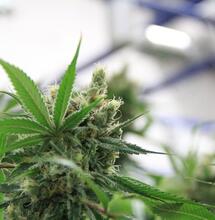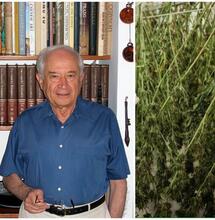Father of Cannabis Research Dies at 92

Hebrew University professor, Raphael Mechoulam, widely known as "the father of cannabis research," has died in Israel at the age of 92. Mechoulam and his team were the first to isolate delta-9 THC in the 1960s. His decades-long career was marked by many more breakthrough discoveries about cannabis, prompting numerous scientific collaborations among world researchers.
Dr. Raphael Mechoulam spent decades of his life probing the medicinal properties of Cannabis. He explored how the various cannabinoids extracted from the plant affect patients who suffer from epilepsy, chronic pain, Alzheimer's, cancer, and other medical conditions. His scope of work essentially enabled Cannabis to enter the mainstream medical debate.
Mechoulam turned 92 last November. His passing away was officially reported by "American Friends of the Hebrew University," where the late professor assisted in forming "The Hebrew University Multidisciplinary Center for Cannabinoid Research" in 2017.
"Most of the human and scientific knowledge about cannabis was accumulated thanks to Prof. Mechoulam. He paved the way for groundbreaking studies and initiated scientific cooperation between researchers worldwide. Mechoulam was a sharp-minded and charismatic pioneer," said Hebrew University President, Asher Cohen, in a statement.
A Bulgarian native scientist and educated as an organic chemist, Mechoulam initially taught Medicinal Chemistry at the Hebrew University in Jerusalem. He moved to Israel after the war and gained his first research experience during his time of service with the Israeli army.
He was the founding member of the International Association of Cannabinoid Medicines (ICAM), which he also chaired between 2003 and 2005.
Not only he and his team were the first to synthesize THC back in the 1960s, but his work at the Weizmann Institute of Science also led to the discovery of the human endocannabinoid system.
Among other significant achievements, Dr. Mechoulam's team also stabilized cannabinoid acid structures such as THCA and CBDA using a simple chemical reaction called esterification. An important discovery that enabled further research on what is the capacity and how acidic compounds found in Cannabis can treat severe diseases.
The more he learned about the therapeutic effects of Cannabis, the more Mechoulam became aware of the potential of this plant to treat various diseases. Thus his comments that rigid drug laws around the globe are slowing down research and keeping valuable medicines out of reach to patients in need.
"We badly need new drugs in several diseases and some of the drugs that are available, may be pretty good but they ultimately cause side effects," he has said. "We have two groups of compounds today that need to have a replacement: these are steroids and opioids. We believe that cannabis carries the ability to introduce replacements to these families."
Read more about Dr. Mechoulam's life work and views on Cannabis here.









